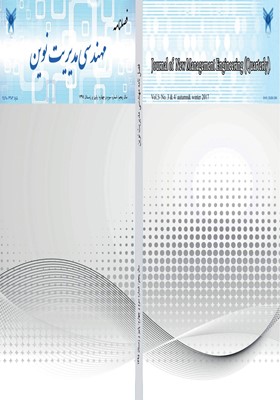تأثیر هوش هیجانی بر ارتقای انگیزش و عملکرد شغلی کارکنان سازمان هلال احمر آذربایجان شرقی
محورهای موضوعی : مدیریت دولتیداوود حسین پور 1 , بهرام اصغری اقدم 2 * , رامین صدیقی 3
1 - دانشیار، گروه مدیریت دولتی، دانشگاه علامه طباطبائی تهران، ایران
2 - دانش آموخته کارشناس ارشد مدیریت دولتی، دانشگاه علامه طباطبائی، تهران، ایران
3 - دانش آموخته کارشناس ارشد مدیریت دولتی دانشگاه علامه طباطبائی، تهران، ایران
کلید واژه:
چکیده مقاله :
زمینه و هدف: هیجانها نقش مهمی در زندگی ما دارند. آنها به رؤیاها، ادراکها و خاطرههای ما انرژی میدهند. هوش هیجانی یکی از جدیدترین مفاهیم مطرح در مباحث مدیریتی است و آن را یکی از مهمترین عناصر رهبری و مدیریتی میدانند. هدف این پژوهش، بررسی تأثیر هوش هیجانی بر ارتقای انگیزش و عملکرد شغلی کارکنان سازمان هلال احمر آذربایجان شرقی میباشد. روششناسی: روش پژوهش، توصیفی-همبستگی میباشد. در این پژوهش برای آزمودن فرضیهها از ضریب رگرسیون خطی و ضریب همبستگی اسپیرمن و برای تعیین برازش متغیرها از مدل معادلات ساختاری استفاده شده است. یافتهها: در این پژوهش از روش نمونهگیری تصادفی ساده استفاده شده است و جامعه آماری پژوهش که شامل کارکنان ستادی هلال احمر آذربایجان شرقی میباشند، 130 نفر بودند که با استفاده از فرمول کوکران 100 نفر به عنوان نمونه انتخاب شدند. در این پژوهش از سه پرسشنامه استفاده گردیده است که برای هوش هیجانی از پرسشنامه استاندارد تراویس برادبری و جین گریوز و برای انگیزش و عملکرد، پرسشنامهای توسط خود محقق به کمک متخصصان و صاحبنظران در این زمینه تنظیم گردیده است. پایایی به دست آمده با استفاده از ضریب آلفای کرونباخ 0/948 میباشد که مورد تأیید قرار گرفت. نتیجهگیری: نتایج پژوهش نشان میدهد که هوش هیجانی با ضریب 0/865 بر انگیزش و با ضریب 0/786 بر عملکرد شغلی کارکنان سازمان هلال احمر آذربایجان شرقی تأثیر مثبتی دارد. بر اساس آزمون رتبهبندی فریدمن بیشترین میزان تأثیر در انگیزش و عملکرد شغلی کارکنان از دیدگاه پاسخ دهندگان به ترتیب خودآگاهی، مدیریت روابط، آگاهی اجتماعی و خودمدیریتی میباشد.

